Russian President Vladimir Putin will visit Japan on December 15-16. In anticipation of his visit, Nippon Television Network Corporation (Nippon TV) and the newspaper Yomiuri Shimbun interviewed the Russian President, focusing on the Kuril Islands dispute and the Joint Japanese-Soviet Declaration of 1956, which restored diplomatic ties. In the interview, Putin stated that the absence of a peace treaty is an "anachronism," inherited from the past and that it must be removed. Putin had previously emphasized this concept during the Asia-Pacific Economic Cooperation forum in Peru, last November 21. Putin said:
"I believe it is obvious to Japan and Russia that the absence of a peace treaty between us is an anachronism that is preventing us from moving on and from developing. Moreover, Russia and Japan are natural partners in the region, where they complement or could complement each other, if their relations were based on a peace treaty, which is, unfortunately, not the case.
"Both Russia and Japan want to sign a peace treaty. The path towards it is not simple, but we have been working on it for a long time. I do not wish to go too far back into the history of the matter, but you know our position.
"The ownership of the Kuril Islands was decided as a result of World War II, and we believe that now they are part of Russia’s sovereign territory, which was sealed in international documents following WWII.
"However, we are ready for a dialogue on this issue with our Japanese partners. We said that there could be different options. I would like to remind you that the Soviet Union and Japan signed a document to this effect in 1956, under which two islands were to be returned to Japan. The framework for this was not stipulated; it was not decided which country would have sovereignty over these two islands, and the conditions for the transfer were not outlined. We know the position of our Japanese partners, who want all four islands. All of this is on our agenda.
"I would like to stress yet again that both Russia and Japan sincerely wish to sign a peace treaty and are looking for ways to do this. As for which approach is new and which is old, this I do not know. I only know that this striving must be supported.
"What can the basis for an agreement be? It can be greater mutual trust, and trust can be strengthened through broader cooperation. This is why Prime Minister Abe has proposed a program for promoting business and economic ties. I believe it consists of eight points and includes the implementation of large projects, not only on the islands, but also between Russia and Japan in general."[1]
In the interview, Putin stressed Russia's willingness to find an agreement while simultaneously reproaching Japan for joining sanctions against Russia. Putin said that Japan maintains some "alliance obligations" with the United Sates, and therefore Russia cannot completely trust Tokyo in an agreement and must verify in advance "the degree of Japan’s freedom [from Washington] and what steps it is ready to take."
Meanwhile, on November 22, the Russian Defense Ministry deployed Bal and Bastion anti-missile systems on the Kuril islands of Iturup and Kunashir. Pravdareport.com reported: "The Bastion coastal missile complex is equipped with P-800 Onyx supersonic missiles. The system is able to destroy surface ships of different classes and types. One system may have up to 36 missiles to be able to protect more than 600 km of coastline. Armed with low-altitude subsonic anti-ship missiles X-35, the Bal missile system is able to destroy ground and surface targets of the enemy at a distance of about 130 km. The X-35 missile is capable of destroying ships with a displacement of 5,000 tons."[2]
It is also worth noting that in advance of the Putin visit, an open letter signed by local Sakhalin officials and scholars appeared on a Sakhalin website (Sakhalinmedia.ru, December 6, 2016). The letter implored Putin to hold firm and warned that any Russian concessions merely to secure a formal peace treaty could galvanize Japanese "revanchist forces" to step up territorial demands that would include not only the group of southern islands but the entire Kuril archipelago, including southern Sakhalin. Economic cooperation with Japan as with any other country had to be based on mutual benefit "without an form of linkage to political demands and references to events in the remote. past." The signers reminded Putin that under the Russian constitution, Russian territory was whole inalienable and this precluded any territorial concession or hints of future concessions. Dear Vladimir Vladimirovich [Putin], we hope that in the course of your talks with the Japanese side you will depart from the position of the inviolability of Russian sovereignty over the Kuril Islands."
Below are excerpts from Putin’s interview:[3]
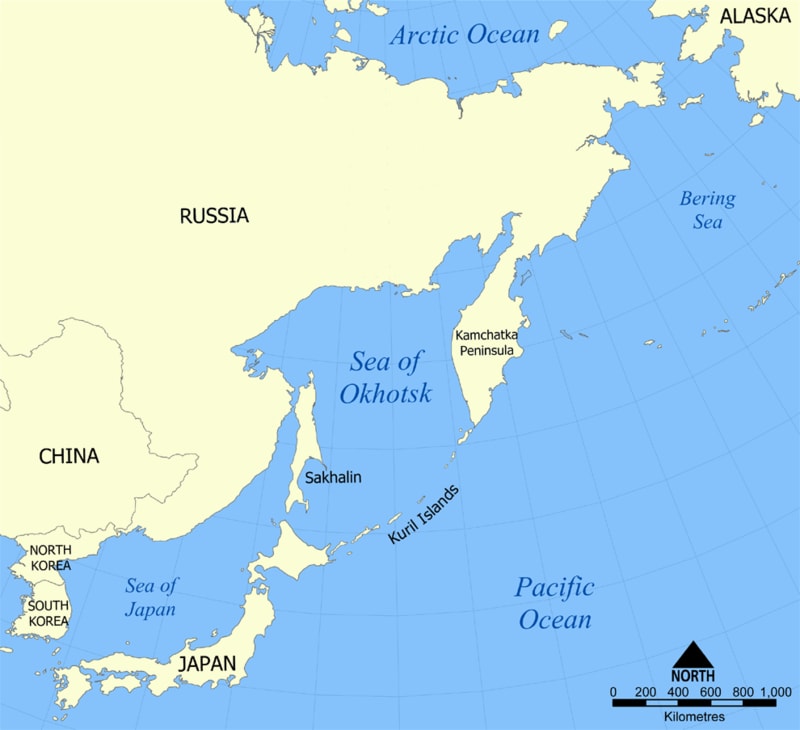
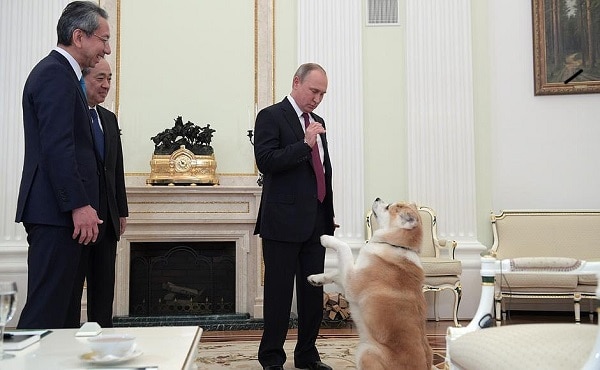
Putin during the interview with Nippon Television Holdings Director Takayuki Kasuya (left) and Yomiuri Shimbun Managing Editor Takeshi Mizoguchi. Yume, an Akita dog, was presented to Putin in July 2012 by the Akita Prefecture, in gratitude to Russia for its help following the 2011 Tohoku earthquake and tsunami.
Putin: 'The Absence Of A Peace Treaty Is An Anachronism We Inherited From The Past And It Must Be Removed'
Q: "This year it will be 60 years since Prime Minister Hatoyama and Prime Minister Bulganin signed the Joint Japanese-Soviet Declaration of 1956. The Japanese people are pinning high hopes on this historic landmark as well. Do you think something special may be expected?"
Putin: "You mentioned the 60th anniversary of the signing of the declaration. It is 60 years since the restoration of diplomatic relations, but relations between Japan and Russia have much deeper roots. In all, our diplomatic ties date back 150 years, more than 150 years now. Therefore, I do not think we should go only 60 years back but should look deeper, centuries back. Maybe this will give us an opportunity to look at the future from a more remote perspective.
"As for these 60 years, and in general more than a hundred years, we have had different periods in relations and there have been tragic pages in our history, but since 1956 when we restored diplomatic relations, regrettably, we have not had a foundation on which to build ties that would correspond to our wishes and that are currently required in bilateral cooperation. We are natural partners in the world and the Far East, but the absence of a peace treaty does not allow us to develop the full range of our relations. Therefore, we will naturally strive to sign this treaty. We want full-scale normalization of relations.
"The absence of a peace treaty is an anachronism we inherited from the past and it must be removed. However, how to do this is a complicated issue. You recalled the 1956 declaration, and this declaration established the rules that should be followed by both sides and that should be put into the foundation of a peace treaty. If you carefully read the text of this document, you will see that the declaration will take effect after we sign a peace treaty and the two islands are transferred to Japan. It does not say on what terms they should be transferred and what side will exercise sovereignty over them. Yet this document was signed and not only signed but also ratified by both the USSR Supreme Soviet, or the Soviet Parliament, and Japan’s Parliament.
"However, after this was done, Japan announced that it would not comply with this declaration. Later on, the Soviet Union also declared that the declaration could not be fulfilled unilaterally, by the USSR alone.
"In 2000 the then Prime Minister of Japan asked me to return to this process, this conversation, these talks, and to do so, incidentally, on the basis of the 1956 declaration. I agreed. Since then we have conducted dialogue in this regard but I cannot say that our Japanese partners and friends have remained within the limits of the 1956 declaration. I think it is too early to pre-empt our talks with the Prime Minister but, of course, we hope to make progress."
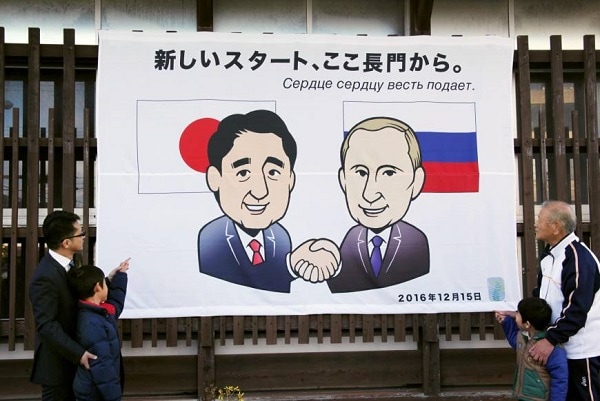
A flag with illustrations of Japanese Prime Minister Shinzo Abe and Russian President Vladimir Putin flies in Yamaguchi Prefecture, ahead of the bilateral talks. (Source: Japantimes.co.jp)
Q: "You said that the 1956 joint declaration is a fundamental document. Mr. President, you have repeatedly discussed this subject with many Japanese prime ministers since 2000. The current Prime Minister, Mr. Abe, acts on the assumption that a peace treaty may be signed subject to a settlement on the status of the four islands. We understand that you and Mr. Abe have been discussing this subject for over a year now. Last autumn in New York (true, for only 10 minutes), this year in Sochi, in Vladivostok and in Lima you discussed it one-on-one. We have calculated that conversations in this format have lasted a total of two hours and 15 minutes. Apparently, it was an in-depth discussion. What prospects, in your view, are there for a decision to sign a peace treaty to be made at the upcoming meeting?"
Putin: "Of course, we will work towards that end. Of course, we will work to achieve this result. However, you have just mentioned the 1956 agreement, and one may recall that these negotiations were later terminated, in effect, on Japan’s initiative. At the request of my Japanese colleagues, in 2000 we revisited the possibility of signing a peace treaty based on the 1956 agreement. However, the 1956 agreement refers to two islands while you have just said that the Prime Minister is talking about four islands. Therefore, we have already gone outside the bounds of the 1956 agreement. This is quite a different situation and quite a different approach.
"I believe it is no secret that I like Japan very much – Japanese culture, sport, including judo, but it will not offend anyone if I say that I like Russia even more. Therefore, the Prime Minister and I will negotiate proceeding from our national interests: the interests of Russia and the interests of Japan. We should find a compromise. We should understand that the results of that terrible tragedy of the 20th century, namely World War II, are enshrined in corresponding international documents, and finding a way to settle all disputes without destroying the entire foundation of international law that evolved as a result of World War II is a highly delicate task. Therefore, I would like to reiterate that we cannot second-guess the course, let alone the outcome of our negotiations.
"Everything that we are talking about has come to us as a result of the events of 70 years ago. In some way or other, during these 70 years we have been involved in some kind of dialogue on the issue, and that includes the conclusion of a peace treaty. However, I wish that in the course of my visit to places the Prime Minister calls home, all of a sudden, we would reach a clear understanding on how we can resolve the matters. We will be very glad if that happens. Are there any chances? Perhaps. There is always a chance, or else it makes no sense to talk. How great is it? Right now, it is difficult for me to say, because this will depend, among other things, on the flexibility of our partners."
SUPPORT OUR WORK


(Source: Twitter.com/sharzhipero, November 30, 2016) Caption: "Japan has filed a protest note following the deployment of missile systems in the Kuril Islands. I suggest sending them this photo from 1945". On August 9, 1945, the "Soviet-Japanese War of 1945" began with the Soviet invasion of Manchukuo, a puppet state created by Japan in China. The Soviets conquered Manchukuo, Mengjiang (inner Mongolia), northern Korea, southern Sakhalin, and the Kuril Islands. In the photo, Russian soldiers with captured Japanese good luck flags, known as hinomaru yosegaki.
Putin: 'Japan Has Joined The Sanctions Against The Russian Federation. How Are We Going To Further Economic Relations On A New And Much Higher Basis, At A Higher Level Under The Sanctions Regime?'
Q: "I am not a politician, not a diplomat and not a negotiator. However, as a Japanese citizen and a member of the media, I would like to note that a very favorable situation has developed: the 60th anniversary of the 1956 declaration. Mr. President, you enjoy remarkably high political support in your country. It is over 80 percent. And the Abe Government also has the strongest position in Japan of all the previous Japanese governments. Polls show it has the support of 50 percent, or 52 percent.
"Taking into account these factors, and the timing, and adding a third condition, specifically that previously, a majority held the view that the four islands should be returned while now, according to a poll, a far greater number of Japanese citizens believe two islands should be returned first, as a member of the media, I believe that all of the three necessary conditions are now in place. And if so many conditions have come together, naturally, we would like to hope that this complicated situation, which, as I understood from your remarks, still exists, would be overcome."
Putin: "You have made a very good point: both the Prime Minister and I enjoy a fairly high level of trust among the citizens of our countries. However, personally, I see this as not having the right to abuse this trust, and any decision we reach should correspond to the national interests of the Russian Federation. Yet our interests, the interests of the Russian Federation, include the normalization of relations with Japan, which is not at the bottom of the agenda. The whole range of what will be proposed for a solution, the entire range of matters related to the normalization of our relations and what that would bring after normalization, this is the whole range of issues to be discussed and decided, and those decisions should be of a practical nature.
"Say, the Prime Minister and I have spoken a lot, and we said all the right things, in my opinion, about creating an atmosphere of trust and friendship between our nations and peoples. Our agreements on creating the conditions for preparing a peace treaty should be rooted in this trust. This may be achieved, for example, by large-scale economic activities that will also cover the Kuril Islands. It may be achieved by solving purely humanitarian issues, for instance, unhindered visa-free travel by former residents of the Southern Kuril Islands to where they used to live: visiting cemeteries, native places and so on.
"This is the large range of issues we have to discuss and make a decision on each one of them. Look, after the resumption of the negotiating process in 2000, we did not refuse to consistently work toward signing this peace treaty. However, at some point a few years ago Japan unilaterally stopped those talks and broke off contacts with us. It was not we who broke off contacts with Japan, it was the Japanese side that broke off contacts with us. This is my first point.
"Secondly, Japan has joined the sanctions against the Russian Federation. How are we going to further economic relations on a new and much higher basis, at a higher level under the sanctions regime? I will not offer my thoughts on what Japan could and should have done, this is none of my business, it is the business of the Japanese leadership. But we should understand how practicable all our agreements are as a whole given the allied obligations Japan has assumed, how much independence there is in making those decision, and what we can hope for, what we can ultimately arrive at.
"These are not simple matters, and even despite the absolutely obvious and positive preconditions you have just mentioned, and they really do exist, can we say with full confidence that we will reach a final agreement right away? I do not know; this is a question that needs thorough discussing, even though, let me reiterate, we are sincerely committed to this result."
Q: "Mr. Abe keeps saying that it is essential to develop dialogue with Mr. Putin. For example, you have just mentioned unimpeded travel so that former Japanese residents of the islands could visit them, and also businesspeople, tourists – to make those relations more free, and on this basis, probably, to develop joint economic activities. This will definitely be connected with progress towards a peace treaty, don’t you think?"
Putin: Yes. As regards humanitarian issues and how to handle them, that was the Prime Minister's initiative. He brought the matter up at our last meeting in Lima and asked me straightforwardly whether we would agree to let Japanese citizens travel on a visa-free basis, resolve the issue in such a way as to enable them to visit the South Kurils, visit their native areas. I said at once that it was quite possible. Our foreign ministries will simply need to sort out some purely technical matters. I see no political restraints here. The same applies to economic matters. We, on our part, are ready. However, let me repeat once again, given that Japan has joined the anti-Russian sanctions, how ready is Japan and how can it do that without breaching its commitments to its allies? We do not know the answer. Only Japan itself knows the answer. However, we need to understand it, to get a clear and precise picture, and to have some guarantees both now and in the future.
"Here is an example from another region. We negotiated the construction of a gas pipeline system along the bottom of the Black Sea to Bulgaria. We signed certain treaties of a technical nature, contracts for laying the gas pipeline. And then Bulgaria created such conditions that the project's implementation became impossible, which was obviously against its own national interests. The former Bulgarian leadership was, in fact, aware of that and acknowledged it. But we trusted them when we were launching that project. Finally, when it became clear that Bulgaria would reject the project and that there was no opportunity for us to implement it, we were forced to scrap it too. We sustained losses amounting to millions, several million dollars. We would not want to get into such situations. I do not want to speak about our cooperation with Japan now. Thank God, we have had no such problems there. Nor would we want any to arise in the future. Therefore, everything needs to be pre-calculated, and we need to agree upon everything in advance. And not just agree, but shape our agreements into legally binding documents guaranteeing the implementation of our mutual commitments."
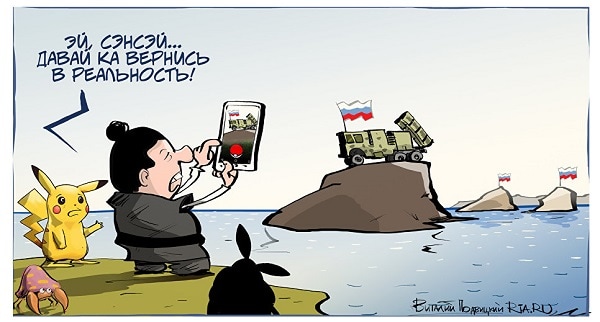
Vitaly Podvitsky, Ria.ru, November 23. Caption: "Hey, sensei, get back to reality".
Putin: 'I Believe It Is Even Hard To Imagine That… We Can Agree To Sign The Documents That We Are Talking About Without Trusting Each Other Or Without Cooperation'
Q: "You pointed out once that the judo spirit should be used to resolve the territorial problem. If we go back to that analogy, is the match still ongoing? That is, let us say, the Olympic regulations allow for competing only for five minutes. Are we still within the five minutes? How long is it before the match ends? Or are we already playing extra time?"
Putin: "No, look, as I said earlier, we were in negotiations, but then the Japanese side suspended them unilaterally. Now, at the request of our Japanese partners, we have reopened these talks. What command is given in this case in judo? You probably know better than I do: Yoshi (continue). So we will continue."
Q: "So it appears that this command reflects the coinciding will of both parties is to continue? In other words, there is another path that has not been trailed before the match is over, and we are unable to say how much of that path is still left. Is that how you see things?"
Putin: "Yes, I believe there are a lot of questions today that require expert analysis by various agencies: political agencies, foreign ministries, economic agencies and security agencies. We need to assess everything and understand what we can agree on and what the implications will be both for Japan and for Russia so that both the Russian people and the Japanese people come to the conclusion that these compromise solutions are acceptable and are in our countries’ interests."
Q: "Does Russia believe it has no other issues with Japan except this one?"
Putin: "Could you repeat that please?"
Q: "Does Russia have no other territorial disputes except this problem with Japan?"
Putin: "We believe we have no territorial problems at all. It is only Japan that believes it has territorial problems with Russia. We are ready to talk about this."
Q: "But, as we see it, the exchange continues at a high level, and a new approach is being sought. The Japanese Prime Minister speaks about a new approach, and there has been some progress in this respect. However, judging by what you have said, that is not how things stand and there has been no progress yet? That is the impression I am getting. Am I wrong?"
Putin: "Yes and no. There is progress in the sense that the Prime Minister has proposed, outlined, as it were, directions for movement toward a peace treaty and the resolution of issues related to territorial problems. Now, what did he propose? He proposed promoting an environment of trust and cooperation. I believe it is even hard to imagine that it can be any different, that we can agree to sign the documents that we are talking about without trusting each other or without cooperation. That is simply impossible even to imagine.
"Therefore, we agree with this and in this respect, certainly, there is progress. For example, the Prime Minister proposed advancing to a new level of economic engagement, putting forward eight lines of cooperation in the most important and interesting areas both for Russia and for Japan. The Prime Minister also highlighted the need to address general humanitarian issues. We already mentioned one of these issues: visa-free travel by Japanese citizens to the South Kuril Islands.
"There are also other areas. For example, culture. This is extremely important. We keep revisiting sport, judo, because I practice it, but other than that, there is also culture. Every year events that are in some way or other related to Russia take place in Japan. Next year, we are going to hold a series of events there that we would like to call Russian Seasons. Over 40 different activities – and what is more, in different cities.
"I assure you that interest in Japanese culture in Russia is just as strong as interest in Russian culture in Japan. It is simply that we treat Japanese history, the history of the Japanese people and its unique culture with greater respect and interest. This generates enormous interest in Russia!
"All of this, if we do it, if we work to achieve all this, we can and should talk about joint efforts toward ensuring international security, and not only in the Far East. Are we not concerned, for example, by the growing danger related to the proliferation of weapons of mass destruction and missile technology? All of this poses a clear threat to the world, to the region. However, we have obvious points of convergence that are related to our interests. If we act together along these lines, we will create conditions, the conditions for trust that Mr. Abe speaks about, so as to take another step and conclude a peace treaty on certain terms. However, first, it is essential to cover this part of the way and then agree on the terms for signing a peace treaty. Both are challenging tasks but they are feasible."
Putin: 'Japan Has Some Alliance Obligations… We Need To Understand The Degree Of Japan’s Freedom And What Steps It Is Ready To Take'
Q: "Mr. President, you have just mentioned Mr. Abe’s eight-point plan. You yourself said that this is indeed the only realistic way for such cooperation, a way towards solving the problems. Do you think the implementation of this plan is one of the crucial conditions for reaching agreement on a peace treaty?"
Putin: "You know, this is not a condition but the creation of a necessary atmosphere.
"We conducted talks on border issues with our friends in the People’s Republic of China for 40 years. There were also issues related to specific territories. Now we characterize Russian-Chinese relations as a strategic partnership, even a special strategic partnership. We have never had such a level of trust with China before. China is our major trade and economic partner among foreign states. We implement joint multi-billion projects. We cooperate not only within the UN Security Council, which is logical, as both China and Russia are permanent members of the UN Security Council, but also within such regional organizations as the Shanghai Cooperation Organization, BRICS, etc. Now we are talking about concluding a free trade agreement between the Eurasian Economic Council, recently established in the post-Soviet space, and China. A similar agreement was concluded a short time ago with Vietnam. Then, we will coordinate, at least we are ready to do this, the Chinese concept of the Silk Road Economic Belt with our newly-created regional organization. So, do you understand how diverse, multi-faceted and deep Russian-Chinese ties have become over the last couple of decades? And we resolved the border issue. This did not cause any major problems, if there were any in China and Russia in this connection, though we both made some compromises. But these were compromises between friendly countries. I think it is almost impossible to achieve such compromise in other ways. I think Mr. Abe’s proposal may be the only way to achieving our goal."
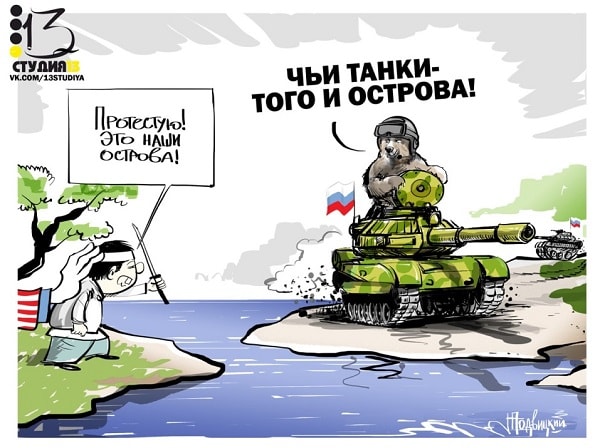
Vitaly Podvitsky, Vk.com/13studiya, July 11, 2016. The cartoon refers to the Kuril Islands dispute between Russia and Japan. A Japanese samurai prodded by an American hand: I protest! These are our islands! The Russian bear : He who own the tanks, also owns the islands.
Q: "You speak about resolving border issues with China and a very high level of trust with China. However, the relations with Japan have not reached such a level. Is that what you mean?"
Putin: "Look, I have just said we have the highest bilateral turnover and continue liberalizing our trade ties, as you know. However, Japan imposed economic sanctions against us. Do you see the difference? Why? Due to the events in Ukraine or in Syria? However, Japan and Russian-Japanese relations are hardly related to the events in Syria or in Ukraine. Therefore, Japan has some alliance obligations. We treat them with respect, but we need to understand the degree of Japan’s freedom and what steps it is ready to take. We should look into this, as these are not minor issues. Our foundation for signing a peace agreement will depend on them. This is the difference between current Russian-Japanese and, for instance, Russian-Chinese relations. I do not want to argue; you asked me what the point is. The point is to create an atmosphere of trust."
Q: "Mr. President, you mentioned a package of measures that we need. One of the directions, as you have also mentioned already, could be economic activity. I share this view. Regarding this joint economic activity, how do you envision it? For example, as one option, and this could be done on all the four islands or on some of them, a special economic zone could be established where such interaction could unfold. How do you envision this economic cooperation as you speak about it?"
Putin: "You know, first, I believe we should broadly expand our trade and economic ties. In the past two years, sadly, Russian-Japanese trade has declined significantly, and we should make every effort to restore the previous level (at least restore) and increase it and move on up. As I said, we are natural partners, because, truth be told, we are interested in Japan’s involvement in developing Russia’s Far East in general and in receiving technologies, for instance. And there are positive examples – for instance, in the automobile industry and other spheres, such as agriculture, where the Japanese are eager to work. By the way, we hope that Japan opens its markets to Russian-made eco-friendly meat products.
"We have many interesting avenues in the energy industry. Nine percent of the natural gas and oil consumed by Japan comes from Russia. Another prospect for development comes from the Sakhalin-I and Sakhalin-II oil and gas projects, which are up and running, with some 75 percent of the products delivered to Japan under long-term contracts. There are plans for constructing the third plant. The work is underway to implement plans to involve Japanese partners in projects on the Yamal Peninsula in Russia’s north. We have plenty to work on that is promising and large-scale.
"As regards the southern Kuril Islands, there are different possible options. We are ready to consider joint efforts on one, two, three, or four islands. The terms are important, but they have to be as liberal as possible. Prime Minister Abe has mentioned this, and I agree with him."
Q: "What will be the legal framework of this activity? Will it be a Russian zone or a Japanese zone, or some kind of a joint zone? How can the legal framework for this be organized? There could be several ways and options. What do you think about it?"
Putin: "I think the Japanese are a very creative and intelligent people. You have just shown a brilliant example of this approach to the discussion by raising the point that economic activity can develop on the islands that would be under Japan’s sovereignty. However, if this occurs from the outset, no second step is needed and the issue can be considered closed. That was not the agreement. We agreed to solve political issues first, fundamentally, and then the issues related to signing a peace treaty, or all of this together – but only if we are aware that we will not be able to solve the signing of a peace treaty and territorial disputes solely by drafting plans for our possible future cooperation. That is why this is a matter for detailed, reasonable and substantive professional talks."
Putin: 'You Keep Referring To The 1956 Declaration But Japan Refused To Fulfill It'
Q: "As a Japanese, I can say that, of course, joint activities have obvious advantages for Japan. And, if some progress is made on that track, it would be sound to achieve some advancement in solving the territorial dispute. I think many Japanese people harbor such hopes and expectations. Mr. President, you yourself have said that the 1956 Declaration is the only legal document signed by our countries that indicates a way towards solving the problem. And the Declaration says that Shikotan and Habomai will subsequently be transferred to Japan.
"You have just told us that there may be different interpretations, in particular, regarding under whose sovereignty this may be done. I think if joint activities do yield fruit, if it works, then to what extent could the transfer procedure issue be solved, for example, under whose sovereignty could the islands be handed over?"
Putin: "It is too early to speak about this. You keep referring to the 1956 Declaration but Japan refused to fulfill it. If the Prime Minister and Japan’s Cabinet of Ministers return to this wording, we will discuss it. If you carefully read the declaration (its Article 9), you will see that it mentions the transfer of the islands but does not specify under whose sovereignty or on what terms. There are too many questions about this issue. Even the 1956 Declaration requires a lot of work. And if our Japanese partners go beyond its framework, this is altogether a separate matter. However, to make progress toward resolving such urgent and long overdue issues, I would agree with the Prime Minister that we need to create an atmosphere of trust, friendship and cooperation between our countries. I believe this is exactly where we should start."
Q: "Concerning the four islands. Mr. Abe says our relations have recently improved in many ways. Regarding the peace treaty talks in the context of the four islands, as long as you both hold the offices of Prime Minister and President, will you be trying to lay the groundwork for resolving the matter? We have already said that both you and Mr. Abe enjoy great public support. Are you committed to resolving this problem?"
Putin: "Of course, we are working toward this. We are discussing this sincerely because we are interested in resolving all the problems of the past in our relations with Japan. Nothing should prevent us from moving forward. This is one of our national priorities. This is what we want, and it is in our interest. That said, I believe that fixing some deadline that is limited by my term in office or the Prime Minister’s would be unprofessional because we should talk not about our terms in power but about the quality of potential agreements. This is the first point. Secondly, as I have already mentioned, yes, trust in the President is quite high in Russia, as it is for the Prime Minister in Japan, but I believe, for one, as I have already said, that I have no right to abuse this trust. Needless to say, each of us would like to achieve major results in our work. If we achieve success… I know his position: he wants to complete this process during his term in office, and I would also like to achieve some meaningful, significant results and not only in relations with Japan but also in other areas, such as domestic policy, the economy, and international affairs. Naturally, I will be working toward this, but I still do not know if I will succeed."
Q: "Thank you. I apologize but I would like you to give an earnest answer now. Do you perceive Mr. Abe as a good partner and as your friend? What is your opinion of him?"
Putin: "I believe that the Prime Minister is, first of all, a consummate professional. This is perfectly obvious. He clearly loves his country very much, is motivated to defend its interests and is very pragmatic in how he goes about it. In my view, he is a very reliable, honorable partner with whom it is possible to agree on highly serious, specific issues. As such, I intend to develop relations with the Prime Minister into the future, including with respect to the most urgent and important issues of our cooperation...."




